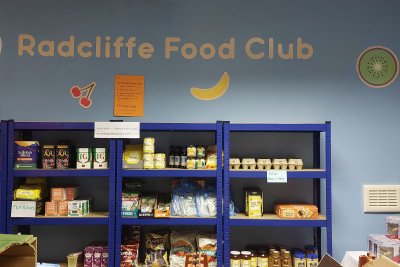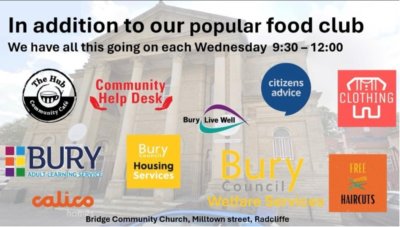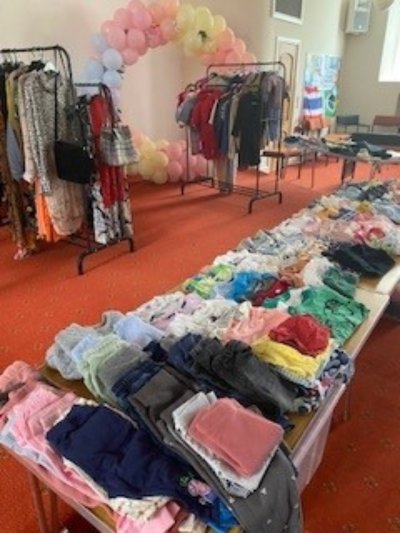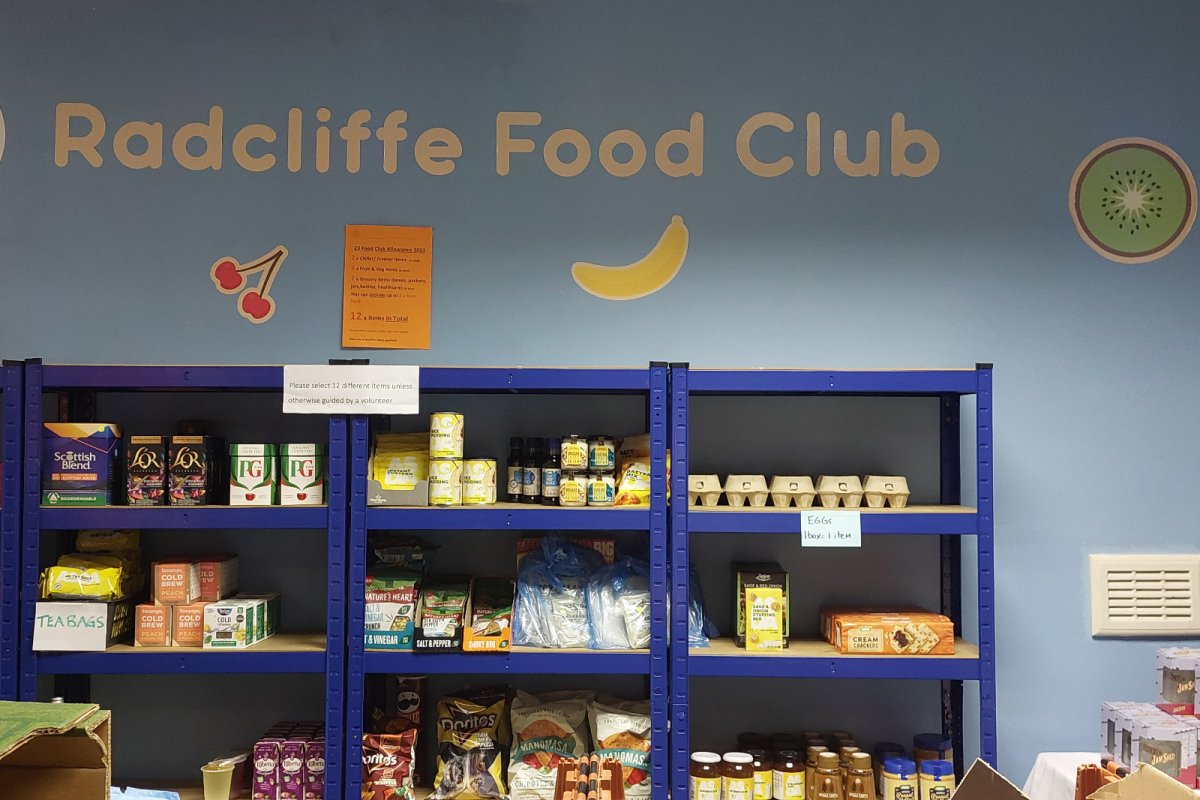 Radcliffe Food Club. Credit: Radcliffe Community Hub
Radcliffe Food Club. Credit: Radcliffe Community Hub
Connecting Community Food Enterprises Case Study: Radcliffe Community Hub
Background
Radcliffe Food Club is a food pantry operating from the Community Hub at Bridge Community Church in Radcliffe, Bury since October 2022. The Hub opens twice weekly on a Wednesday morning and evening with approximately 100 members attending each week, with 53 using the pantry. The Food Club developed following a successful free breakfast provision at the Hub, which continues to operate as a community café, alongside other services and community activities.
To find out more, watch this interview with two of the volunteers from Radcliffe Community Hub.
Business Model
The Radcliffe Food Club operates as part of the Community Hub, following a pantry model. They open with two time slots on a Wednesday, in the morning and evening, welcoming around 53 members each week. Members pay a membership fee of £5 per year which includes an initial free shop of 12 items across the range. Following joining, members can shop each week, paying £3 cash each visit for 12 items which gives them approximately £16.50 worth of goods. The Food Club supplies a range of ambient, chilled, produce and frozen items, with core items such as milk, eggs, baked beans, soups and bread always being available, as well as a range of fresh fruit and vegetables.
The Food Club is ran by an enthusiastic team of 20 volunteers, nine of whom initially joined the Club as members.
The club is open to anyone that lives in Radcliffe and inclusive to everyone in the community, including supporting people seeking asylum, single partners, pensioners and people experiencing homelessness. Radcliffe is the most deprived area within the metropolitan borough of Bury with 66.4% of households being classified as deprived in at least one dimension at the time of the 2021 census.
Due to high demand, the Food Club introduced a ticketing system to control the flow of shoppers whilst still maintaining the first-come first-served principle where possible. As people wait to use the shop, the Community Café has become increasingly popular with a variety of breakfast items offered, all free of charge, including bacon and sausage sandwiches, beans on toast, various pastries, crumpets and miscellaneous offerings depending on what is available.
In addition to the Food Club and community café, advice and support services are available in the same building including housing support, digital skills, wellbeing services, and a parent and toddler club Happy me Happy Mums. They also host one off and seasonal events for the community such as cooking classes, Easter eggs, COVID vaccines and flu boosters, and a visit from Pudsey Bear for Children in Need! They also run a clothing and gifts stall selling second hand items which has raised £1,000 since September.
Radcliffe Community Hub works closely with Bury Food Partnership and Bury council, as well as participating in Sustain’s national Connecting Community Food Enterprises project. They are in the process applying for status as a Charitable Incorporated Organisation with a board of trustees.

Impact on the community
As of March 2024 the Food Club had received over 3,000 visits with the hub receiving around 100 visits each week. Radcliffe Food Club work to ensure members and servers have a say in how the club is run, by asking for feedback and sending out questionnaires. Where possible they use feedback to make improvements to the shop.
“The Food Club has helped me so much over the last few weeks. I have received nothing but support, smiles and a comforting when needed. There’s always a wide range/ choice of food and nobody goes short. As well as them gifting me a present for my daughter’s birthday because Christmas has been so expensive”
“It’s made a lot of difference to my life and the staff and people who attend are also friendly”
“I work for the NHS but have been struggling getting to pay-day with the increase in costs- fuel, mortgage etc. The club is helping me get to pay-day. The staff/ volunteers are so friendly and helpful”
“Finding the Food Club has been a life-saver. I have struggled to buy essential items recently and this has really helped. It’s also nice to get occasional treats. The staff are very friendly and helpful. I look forward to Wednesdays”
Food supply and logistics
The main sources of food are Fareshare (delivery and collection), as well as supermarket surplus and donations, and Audacious Church Manchester donations. They do not currently have connections with local suppliers, but are interested in exploring this.
Funding and opportunities for social investment
Funding comes from a combination of church funds, donations of cash and food, and charitable grants. They receive some investment from local housing associations and private builders. This has been used for new fixtures and fittings, counters and a freezer. All membership fees and food trading are used to purchase stock for the Food Club, as is income from the clothing stall.
They are limited to what can be achieved without significant additional funding, and are seeking support from both the private and public sector for this which would facilitate the provision of additional opening times, hot meal provision, warm space for educational classes and, down the line, support in finding employment.
Through the Connecting Community Food Enterprises project, the Food Club has been exploring future strategy, social investment and diversification of income to support the longevity of the Club.

Challenges
Funding remains a challenge for Radcliffe Food Club, with the low-cost model not covering all running costs, and specifically not covering the cost of the electricity to run freezers for display and storage on food items which reduces waste of fresh food. Church electricity bills have increased by £7,000 since the Food Club opened and price increases have been absorbed. Maintaining the supply of food items is always a challenge so they have to drive to collect extra supplies relying on volunteer time and expense. In terms of food item supply proteins are very expensive and they do not have the financial resources to prioritise these.
Future plans and aspirations
Their vision is to have a bustling community hub in central Radcliffe where services can be accessed easily by the community and where help is available 5 days each week. Funding is required to source permanent staff roles to complement a larger volunteer base and to cover the day to running costs of such a service: utilities, food supplies, meal preparation, furniture etc.
Radcliffe Community Hub would like to thank so many individuals and organisations along the way that have been so very supportive and generous with their time, donations, financial support, grants, best wishes and prayers. They are keen for people to reach out with ideas, connections and advice, and visits are always welcome. Please contact Project Co-ordinator Paul Wright or Tom King for more information.
Bury Food Partnership and Bury Voluntary, Community & Faith Alliance
The Bury Food Strategy and Bury Food Partnership were successfully launched in January 2021, and has for four years been a collaboration of positive, proactive partners interested in healthier and sustainable food. They achieved the Sustainable Food Places bronze award for Bury in June 2022. Recent partnership activity includes the development of an innovative Path to Pantry film and resource to support those who wish to transition from food bank to food pantry. They are also working in partnership with award winning Bury Market, to become a Healthy Start destination for the first time. This supports the local economy, drives footfall into the town centre and increases access to fresh, quality food produce. Both work streams have generated positive activity and momentum within our partnership and wider networks. Please see the Bury Food Partnership page where food system information, resources and media articles are shared.
Bury Community Support Network (BCSN) brings partners together to focus on working to address food insecurity related issues. Members are independent charities, food banks and pantries who directly support people experiencing poverty. Representation from this network is a key element of the Bury Food Partnership. Both the BCSN and Bury Food Partnership feed directly into the Bury Anti-Poverty Steering group.
Bury Community Support Network is facilitated by Bury Voluntary, Community & Faith Alliance (Bury VCFA). Bury VCFA supports capacity building to strengthen the sector, sharing of best practice, peer support, funding and governance support. They gather insights that influence strategic decision making and promote the work of members directly into Bury’s Anti-Poverty Steering group.
Good Food Enterprise: Working to provide food that is good for people and the planet, and support local production playing a part in community beyond trading.
Sustain
The Green House
244-254 Cambridge Heath Road
London E2 9DA
020 3559 6777
sustain@sustainweb.org
Sustain advocates food and agriculture policies and practices that enhance the health and welfare of people and animals, improve the working and living environment, promote equity and enrich society and culture.
© Sustain 2025
Registered charity (no. 1018643)
Data privacy & cookies
Icons by Icons8
